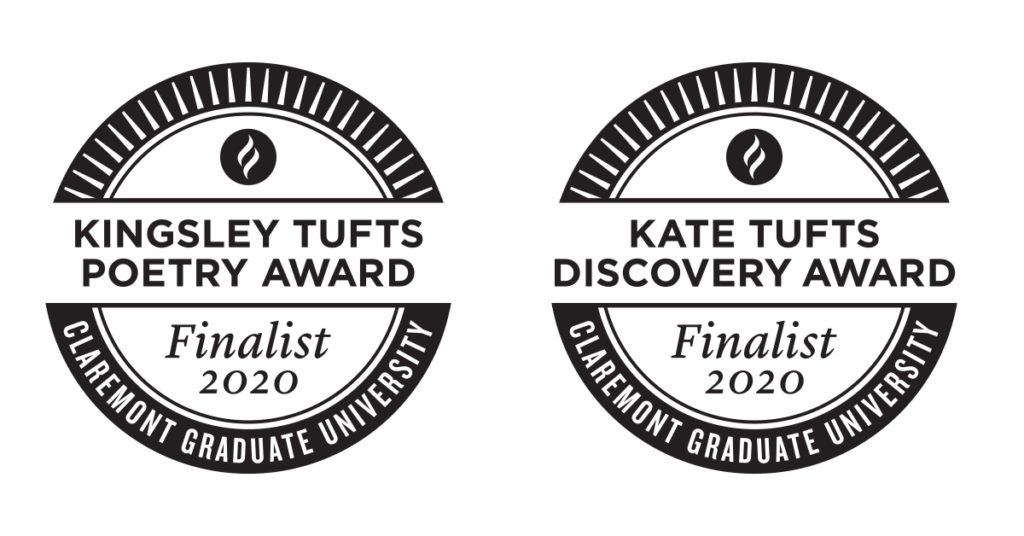Ten Poems, Ten Poets

Reflecting back on all of the finalists and winners of the Kingsley & Kate Tufts Poetry Awards, I want to share a way to experience their poetry for yourself. Here are links to their poems and my quick reviews of our 10 incredible 2020 finalists and winners:
Brian Teare: Kingsley Tufts Poetry Award Finalist
“Olivine, Quartz, Granite, Carnelian” (2019)
This poem from his most recent book, Doomstead Days (Nightboat, 2019), brings poetry into the natural world as it observes poetry’s ability to envelope nature. Teare evokes movement in this poem as it begins with the exteriority of the blissful open air, then hits the reader with the real-world interiority of bodily decline and ends with the return to an embracement of the natural world once again.
Natalie Scenters-Zapico: Kingsley Tufts Poetry Award Finalist
Scenters-Zapico is masterful in her understanding of the limits of language and physicality. This poem presents a desire for protection from a kind of haunting that cannot be adequately articulated. This poem illustrates a yearning for something real yet that something is incapable of materializing.
Ilya Kaminsky: Kingsley Tufts Poetry Award Finalist
“From Deaf Republic: 1” (2019)
This poem, from the poet’s most recent and critically acclaimed book, Deaf Republic (Graywolf Press, 2019), creates a feeling of suffocation and deep inhalation as it follows a pregnant couple’s close relationship. The poem’s engagement with air helps to exemplify the couple’s love for one another and their trust in an ambiguous future.
Monica Ferrell: Kingsley Tufts Poetry Award Finalist
This poem is a meditation on one’s apartment. This exploration of an apartment’s history and one’s place within that history is an interesting read considering many of us have been forced to reflect on our own similar position within our apartments lately.
Emily Jungmin Yoon: Kate Tufts Discovery Award Finalist
This is one of the most recent poems published by Emily Jungmin Yoon. “Elsewhere” explores a place that cannot be defined but is most certainly inhabitable. As the poet reminisces on the death of her dog, she finds a kind of solace in death that can yield to enlightening possibility.
Ashley Toliver: Kate Tufts Discovery Award Finalist
“Housekeeping I” and “Housekeeping II” (2018)
These two poems, from Toliver’s most recent book, Spectra (Coffee House Press, 2018)wades in the discoveries one encounters after sifting through things forgotten. Toliver brings to light the revitalizing process of cleaning, and the brilliance of uncovering what was once hidden.
Valencia Robin: Kate Tufts Discovery Award Finalist
Robin explores the construction of time in this poem, and its seeming uselessness as it is juxtaposed to lives lost. As the poem follows the life of a young Danny Johnson, and the death of his brother in Vietnam, the backdrop of the Danny’s neighborhoods acts a protection and subsequent representation of the devastation of a community.
Ángel García: Kate Tufts Discovery Award Finalist
This poem is from García’s most recent book, Teeth Never Sleep (University of Arkansas Press, 2018). It illustrates the emotions of a man who has just found out that his significant other is pregnant. As the poet ponders the tiny earlobes forming within the woman’s womb, “Lobe” examines the minute thoughts that come to mind when one thinks of a being beginning to grow.
Ariana Reines: Kingsley Tufts Poetry Award Winner
“Son of a Jar” comes from her most recent work, A Sand Book (Tin House Press, 2019) that Thurston Moore claims has “Lines that make me want to have sex on the moon.” This poem examines sensual limits, and the desire to remain within oneself. As the poem ventures to different lands and back again, it emphasizes the ability to find sustenance in one’s own body rather than fixating on the desire of another.
Tiana Clark: Kate Tufts Discovery Award Winner
“Cross/Bite” is the first poem in Clark’s newest collection of poems, I Can’t Talk About the Trees Without the Blood (University of Pittsburg Press, 2018). As an examination of the body, this poem works to embrace one’s imperfections. Clark’s poem shows the ways that one can love and ultimately miss the things that make us unique if they so happen to be surgically erased.
—Jordan Wheatley
Share